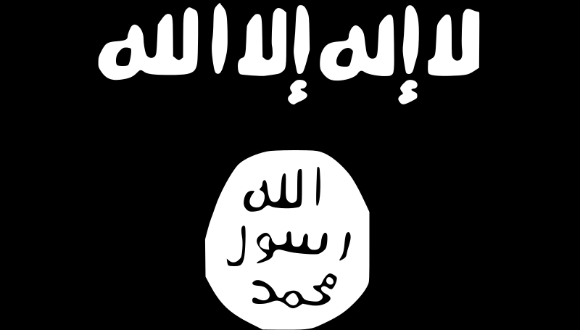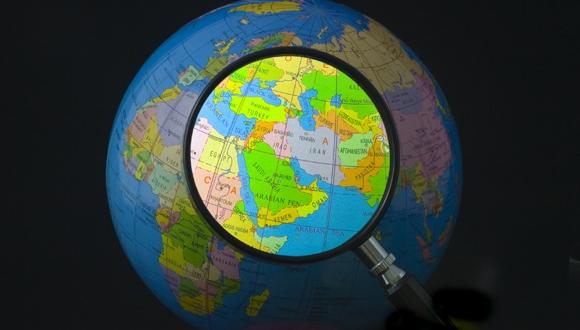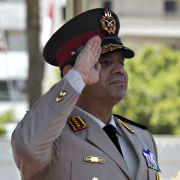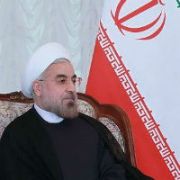Iraq: Economics and the Collapse of the State
 Iraq, the state created by the British in the 1920s, is breaking apart. If this process continues then the Kurds, the Sunni, and the Shiʿa will each have separate regions that could become new states. The Kurds in the northeast of the country have almost reached independence but have not declared it. Even if the three groups could live side-by-side, there are serious questions about the stability and even the homogeneity of the Sunni and the Shiʿi communities. The other key issue is oil: what will be the effect of new borders (if they can be described as such) on the viability of the three communities/countries and what will be the effect on the international oil market and the world economy?
Iraq, the state created by the British in the 1920s, is breaking apart. If this process continues then the Kurds, the Sunni, and the Shiʿa will each have separate regions that could become new states. The Kurds in the northeast of the country have almost reached independence but have not declared it. Even if the three groups could live side-by-side, there are serious questions about the stability and even the homogeneity of the Sunni and the Shiʿi communities. The other key issue is oil: what will be the effect of new borders (if they can be described as such) on the viability of the three communities/countries and what will be the effect on the international oil market and the world economy?
The CIA estimates that 99 percent of the Iraqi population is Muslim: 60-65 percent Shiʿa; 32-37 percent Sunni; the rest are Christian and others. It estimated that its ethnic composition is 75-80 percent Arab; 15-20 percent Kurdish; and the rest: Turkoman, Assyrian and others. In January 2013 there were 1,131,810 registered internally displaced persons in Iraq and by June 2014, the U.N. reported that there were over 200,000 registered Syrian refugees there. Since 2003, hundreds of thousands of Iraqis fled to Syria and Jordan following the U.S.-led invasion. Furthermore, an estimated one million people have been displaced by the recent fighting that has resulted in the conquest of large areas of the center of the country (as well as parts of Syria) by ISIS - the Islamic State of Iraq and Syria (in Arabic: Dawla al-Islamiya fil-Iraq wa al-Sham and refers to the historic idea of a greater Levant) and recently renamed, IS (Islamic State).
In 2012, Iraq had a national income of $216 billion, a population of 32.6 million, and national income per capita of $6,626. About 20 percent of the population lived below the official poverty line and a larger share lived just above it. The three wars – with Iran from 1980 to 1988 and with U.S.-led coalition forces in 1991 and 2003 – along with international sanctions and internal instability have taken a severe toll on the welfare of the Iraqi population. Living standards have fallen sharply, as Iraq’s per capita gross domestic product declined by more than one-fifth in real terms between 1980 and 2011.
The country faces severe environmental problems and a joint U.N.-Iraqi government report (Iraq State of Environment and Outlook, published in Arabic) stated that while 31 percent of Iraq's surface is desert an additional 39 percent of the country's surface is affected by desertification, and much more is under threat. As a result of declining soil moisture and lack of vegetative cover, there has been an increase in the frequency of vast dust and sand storms, often originating in the western parts of Iraq. Population growth, approximately 2.5-2.8 percent a year, has intensified pressure on food, water, and energy resources. Access to safe water and sanitation remain a challenge: 83 per cent of wastewater is left untreated, contributing to the pollution of waterways and the environment in general. Years of conflict and violence resulted in chemical pollution and unexploded ordnances, which has affected some 1.6 million Iraqis.
Iraq has the world's fifth largest proven crude oil reserves. At the end of 2013, they came to 150 billion barrels, which is almost nine percent of total world reserves. Iraq was also the world's eighth largest producer of petroleum. The country's oil and gas resources are unevenly divided across sectarian-demographic lines. Most of the known resources are concentrated in the Shiʿi areas of the south and the Kurdish region in the north, with few in areas under the control of the Sunni minority in central Iraq.
The majority of the known oil and gas reserves in Iraq form a belt that runs along the eastern edge of the country. Iraq has five giant fields (with over 5 billion barrels each) in the south that account for 60 percent of the country's proven oil reserves. An estimated 17 percent of oil reserves are in the north of Iraq, near Kirkuk, Mosul, and Khanaqin. Control over rights to reserves is a source of controversy between the ethnic Kurds and other groups in the area. The International Energy Agency (IEA) estimated that the Kurdistan Regional Government (KRG) area contained 4 billion barrels of proven reserves. However, this region is now being actively explored, and the KRG has stated that the region may have 45 billion barrels of unproven oil resources.
As a result of its huge oil wealth, Iraq has enormous economic potential. According to the International Energy Agency in its Iraq Economic Outlook (2012), production in its central scenario could more than double to 6 million barrels a day (mb/d) by 2020 and reach 8.3 mb/d in 2035.The largest increase comes from the oilfields in the southeast around the port of Basra. A resolution of differences over governance of the hydrocarbon sector would permit growth in the north of Iraq, where contracts awarded by the Kurdistan Regional Government – contested by the federal authorities – have made this one of the most actively explored hydrocarbon regions in the world.
Iraq could earn almost $5 trillion in revenues from oil export over the period to 2035, an annual average of $200 billion. Achieving this will require rapid progress along the energy supply chain. Rigs will need to be available at the right time; investment to bring as much as 8 mb/d of water inland from the Gulf to the southern fields will be essential to support oil production and to reduce potential stress on scarce freshwater resources; oil storage and transportation capacity will be needed to accommodate the expansion in output and diminish the risk of over-reliance on the southern seaborne route. All this requires an end to conflict in the country.
Iraqi oil production rose from 1.9 mb/d in 2005 to 3.1 mb/d in 2013 and this rise balanced declining output in Iran and Libya and thus contributed to the stability of international oil markets. The level of production is, however, threatened by the current conflict.
Between 2010 and 2013, Iraq's oil income totaled about $330 billion. As a result of political conflict and corruption, the government has been unable to use many of the funds it receives effectively. The Shiʿa have repaced the Sunni as Iraq's rulers and have excluded others from the benefits. This is one of the main reasons why the Kurds have tried to create their own state and why the IS has suceeded in taking over much of the Sunni areas of the country.
The IS has come into being as a result of the collapse of central government authority in the Sunni dominated center of the country. It has, in many respects, robbed its way to power having seized what some (disputed) reports claim to be as much as $400 million from the central bank in the city of Mosul, Iraq's second largest city that it has captured. It reportedly emptied the vaults in all the other banks in a city of more than one million residents. Its extortion rackets in Mosul may yield as much as $8 million a month. The government claims that the insurgents had levied taxes on Christians in Mosul, where they were a significant minority there, to avoid being crucified.

Pictured: Flag of the Islamic State (Courtesy of Wikimedia Commons)
Battles have taken place for control of Iraq’s biggest oil refinery at Baiji with a production capacity of 310,000 barrels a day. Baiji supplies Iraq with a third of its domestic fuels, and a nearby 600-megawatt power plant provides 30 percent of the country’s electricity.
The IS started accumulating funds in Syria in 2013 after it took over the eastern Syrian oil fields, near Raqqa. It operates primitive refineries there to make products for use by its own fighters, but also sells much of the crude to its enemy — the Syrian government In Minbij, it runs a local cement factory, and in Raqqa merchants even pay the militants a trash collection fee. By invading Iraq, IS has expanded its revenue base money by smuggling and selling archaeological artifacts among other things.
Although their ideology calls for all non-Sunni Muslims to be killed, IS has sometimes overlooked this when there were financial incentives to do so. Turkish and Indian workers, as well as a Chinese official, were among those who disappeared in IS territory and were later released unharmed.
The control of rivers, canals, dams, and sewage and desalination plants has become a major weapon for the IS. These are now all military targets in a country that regularly experiences extreme water shortages. The IS now control most of the key upper reaches of the Tigris and Euphrates, the two rivers that flow from Turkey in the north to the Gulf in the south and upon which all Iraq and much of Syria depends on for food, water, and industry.
Iraqi troops have been sent to defend the 9 kilometer-long Haditha Dam and its hydroelectric works on the Euphrates to prevent them from falling into the hands of the IS. Were the dam to fall, the rebels would tighten their grip on Baghdad. The precedent exists: In April 2014, the IS in Fallujah captured the Nuaimiyah Dam on the Euphrates and deliberately diverted its water to “drown” government forces in the surrounding area. Millions of people in the cities of Karbala, Najaf, Babylon, and Nasiriyah had their water cut off, but the town of Abu Ghraib was catastrophically flooded along with farms and villages over 200 square miles. According to the U.N., approximately 12,000 families lost their homes.
The IS success is based on its control of economic resources: roads, rivers, dams, refineries, and funds that it has stolen. Although IS is Sunni, its ability to retain the support of/maintain control over the Sunni populations in Iraq and Syria on the basis of their ideology remains unclear. Its control of military force and its possession of economic assets to finance its activities is the key to its current success.
The Sunni and Kurdish regions of Iraq present opposite examples of development. The former is based on terror and robbery while the latter is based on attempts to develop the economy. The Kurdistan Regional Government (KRG) governs an area which, in 2011, had a population of 5.3 million and GDP of $24 billion. The Kurds have taken over the main oil town in the north, Kirkuk. The KRG has pursued an independent policy based on the exploitation of its oil resources, while the central government threatened to sue anyone involved in what it regards as illegal exports. The KRG has concluded oil development contracts with some 50 foreign companies in order to increase crude oil production to 1 million barrels per day in 2015 and 2 million in 2019. The economy has benefited from foreign investment in many sectors, especially by Turkish companies.
Meanwhile the central government administration in Baghdad is paralyzed by political conflict and financial capital is leaving the country. Most governorates have stopped paying salaries while some have announced up to 90 percent cuts to private sector funding. Resources to purchase fuel and pay for maintenance in some industrial and agricultural sectors have been exhausted. The Ministry of Planning had also announced that 96 percent of the projects included in the 2013 budget were not completed: only 200 projects were finished, out of the 8,000 in the budget plan. Unemployment has reached 24 percent and the livelihood of millions in the public and private sector is threatened by the failure of the government to allocate funds. All this in what is or was oil-rich Iraq!
The development of Iraq's oil potential requires an end to the internal conflict which has intensified in recent months. If Iraq's oil exports cease, or are seriously reduced, then international prices would rise, something that would benefit other producers but worsen the already fragile international economy.






